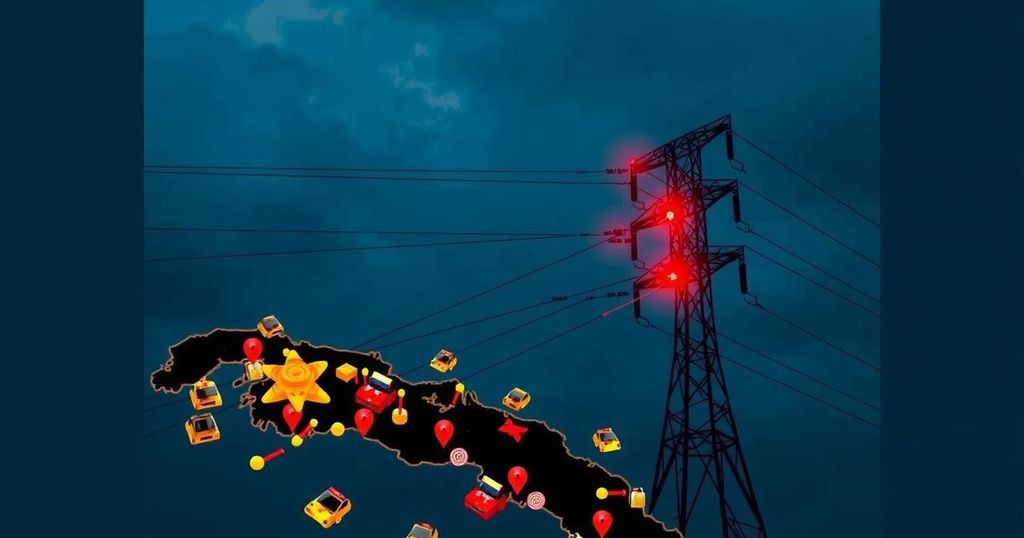Cuban Power Outage Crisis Deepens as Hurricane Oscar Approaches

Cuba faces a significant power crisis, with millions enduring three days without electricity amid the approach of Hurricane Oscar. Efforts to restore power have repeatedly failed, with systemic issues in the aging energy grid contributing to these outages. The situation raises public discontent, as citizens struggle with shortages in essentials and the impact of economic sanctions from the United States.
Millions of Cubans are experiencing a prolonged power outage as the country enters its third consecutive day without electricity. Efforts to restore power were hampered when the already strained electrical grid succumbed to overload once more late Saturday. According to the Cuban Electrical Union, approximately 16% of the nation had power restored at the time of the incident, although officials have not indicated when full service might resume. This power crisis marks the third widespread failure of the energy grid since Friday, leaving most of Cuba’s 10 million residents without power. The situation has been further exacerbated by the approach of Hurricane Oscar, which is expected to strike eastern Cuba, bringing with it strong winds and heavy surf. Forecasts suggest that Hurricane Oscar, which made landfall on Inagua Island in The Bahamas with maximum sustained winds reaching 80 mph, is likely to reach Cuba’s northeastern coast later this afternoon. Although the hurricane is expected to weaken after landfall, it could still maintain tropical storm status as it moves northward late Monday. The initial blackout occurred on Friday due to a failure at one of Cuba’s principal power plants, leading to subsequent nationwide outages within hours. The persistent blackouts are threatening to deepen the country’s already precarious crisis, as reliable power is crucial for water supply and food preservation. In Havana, residents have resorted to using online messaging platforms to share information about power availability in various neighborhoods, while some have coordinated to keep medications refrigerated using the power of those fortunate enough to have temporary electricity. Queues for basic necessities such as bread have formed across the capital, with tensions rising among those waiting in line. Many citizens have expressed concern over the absence of Cuba’s traditional allies—such as Venezuela, Russia, and Mexico—which have historically supplied the island with the necessary fuel to sustain energy production. Tourists in the city continue to explore in classic 1950s vehicles, although many local hotels are running low on generator fuel. Reports have emerged indicating that José Martí International Airport in Havana is operational only on emergency power, with malfunctioning printing facilities and a lack of air conditioning within the terminal. Furthermore, demonstrations have been reported in response to the ongoing crisis, indicating growing public unrest. Cuban officials attribute this energy predicament to a combination of factors including increased economic sanctions from the United States, recent hurricane disruptions, and the deteriorated state of the island’s infrastructure. In an address that faced technical difficulties, Prime Minister Manuel Marrero Cruz stated, “We have been paralyzing economic activity to generate (power) to the population.” This remark underscores the extreme measures being taken to manage the power shortages. The Minister of Health, José Angel Portal Miranda, assured the public that health facilities are operating on generator power and that essential services continue to be provided to the population.
The recent series of power outages in Cuba stems from a combination of an aging energy infrastructure, natural disasters, and international economic pressures. The country’s electrical grid has repeatedly failed under strain, demonstrating its vulnerability. Hurricane Oscar’s imminent arrival poses an additional challenge, threatening to disrupt recovery efforts and worsen existing conditions. The crisis has led to significant public unrest, highlighting the ramifications of both domestic management failures and external pressures, particularly U.S. sanctions. These complex issues underline the necessity for urgent measures to stabilize the energy sector and restore reliable power across the island.
In summary, the ongoing power outages affecting millions of Cubans represent a severe challenge for the nation, compounded by the impending threat of Hurricane Oscar. The series of blackouts highlights the fragility of Cuba’s energy infrastructure and the complexities involved in managing such crises. The situation has sparked public unrest and underscored the critical need for both immediate solutions and long-term infrastructure reform to ensure a stable energy supply for the Cuban population.
Original Source: www.cnn.com






